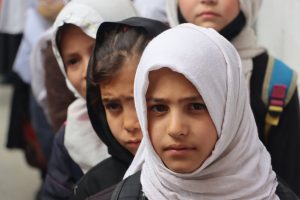In 1979, Russia, as the Soviet Union, invaded Afghanistan, unleashing a decade of violence with lasting repercussions, including the mass displacement of millions of Afghans. Arguably, the creation of the Taliban in 1994 is rooted in the aftermath of the Afghan-Soviet War. Half a century later, Russia once again made a senseless move in Afghanistan, this time as the first country to formally recognize the Taliban — the most extreme terrorist group in Afghanistan’s history — as Afghanistan’s legitimate rulers. This move comes at a time when there has been no sign whatsoever of change from the Taliban regarding its appalling human rights and women’s rights record.
Since taking power in August 2021, the Taliban have banned girls’ education beyond grade six, dismissed women from most government and non-government jobs, imposed severe restrictions on women’s mobility, and violently suppressed women’s protests, silencing any attempt to claim their rights. These bans have placed Afghan women and girls in a state of despair and deprivation, as they’ve watched their futures slip away from them.
With Russia distinguishing itself as the first country to formally recognize the Taliban, the people of Afghanistan, especially Afghan women and girls, have once again become victims of the self-serving policies and power-driven rivalries of regional countries.
Russia’s decision, made while Afghan women remain deprived of their rights to education, work, and exercise freedom of movement, shows that geopolitical interests trump women’s fundamental rights and persistent hopes for a future where their role in their country’s social, political, and economic life is restored. Instead, Russia’s recognition of the Taliban grants international legitimacy to a regime that lacks any domestic legitimacy, silences every voice demanding freedom and rights, and imposes gender apartheid. This diplomatic move shatters the hopes of Afghan women and girls who, despite threats and restrictions, are still fighting for education, employment, and the restoration of their rights.
While Russia’s move may not be immediately emulated by others, it still undermines international pressure on the Taliban to respect human rights and to open social and political spaces, diminishing the already fragile hope of millions of Afghan women and girls.
Russia’s move is calculated; Moscow has been gradually intensifying relations with the Taliban in a series of moves that culminated in full diplomatic recognition. Since the Taliban’s takeover of Afghanistan in August 2021, Russia has maintained unofficial relations with the group it designated a terrorist organization in 2003. Russia hosted the Taliban in Kazan for talks on regional security concerns in 2023. That same year, Russian President Vladimir Putin called for strengthened relations with the Taliban, signalling a shift in regional policy and Russia’s interest in expanding its influence in Afghanistan.
The move to recognize the Taliban may eventually inspire other countries, especially those in Russia’s orbit, to follow suit when they see the lack of consequence for letting go of any conditionality on the Taliban to respect human rights, reopen girls’ schools, and reintegrate women into the workforce and society. If more countries follow Russia’s lead, the Taliban will feel empowered that they can indeed gain international legitimacy without changing their repressive policies.
Russia’s recognition of the Taliban provides much sought-after legitimacy to a regime that is enforcing the world’s most extreme version of gender apartheid. One significant dimension of this recognition is its psychological impact on Afghan women and girls. Those who have resisted the Taliban’s restrictions over the past three years, striving for education and employment, are receiving the disheartening message that the international community does not care about their situation and that the Taliban, despite oppression and injustice, can gain international legitimacy. This will no doubt trigger yet a new wave of depression, despair, and anxiety among Afghan women and girls, further reducing their sense of hope that change will come.
Moscow’s recognition also provides the Taliban with access to financial resources and increased economic exchange with Russia and its allies. At first glance, this may appear to improve Afghanistan’s economic situation, but in reality, these resources are more likely to strengthen the Taliban’s machinery of repression than to help its poverty-stricken people, as there is no transparent mechanism to monitor how these funds are used.
Further, Russia’s move may encourage other extremist groups in the region to emulate the Taliban’s model, using violence to seize power, secure in the knowledge that it will prove no barrier to eventually gaining international legitimacy, with a little patience. This will further erode fragile democratic transitions in the region and weaken regional security, with risks that could spill over into other countries.
To counter the negative effects of Russia’s move, the international community should reinforce unity in the policy of non-recognition of the Taliban and encourage regional countries to continue pressuring the Taliban to respect human rights and women’s rights.
The international community should also advocate for including gender apartheid as a crime in the proposed global treaty on crimes against humanity currently advancing at the United Nations; support and resource the International Criminal Court (ICC) to speed up its investigation into the Taliban’s systematic gender-based persecution and human rights violations against Afghan women and girls, ensuring accountability for senior Taliban leadership; use targeted pressure tools, including individual sanctions on Taliban leaders directly responsible for human rights and women’s rights violations; and continue supporting Afghan women and girls through scholarships, distance learning programs, and support for teachers and women activists inside and outside Afghanistan.

































